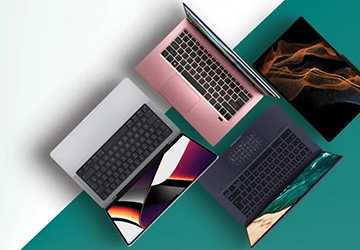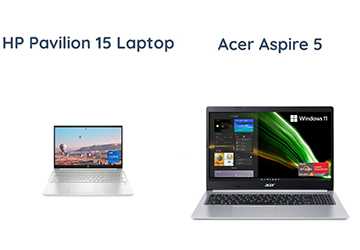How to Choose the Right Laptop for Your Needs
Selecting the perfect laptop can be daunting with the myriad options available today. Whether you need it for work, study, or casual use, making the right choice requires careful consideration of your specific requirements. This article will guide you through choosing a laptop, focusing on selecting a laptop by specs, laptop options for students, and how to choose a computer for work.

Understanding Your Needs
Before diving into technical specifications, it's essential to understand what you need from a laptop. Are you a student looking for a portable and affordable machine? Or a professional who needs a high-performance device for demanding applications? Identifying your primary use case will help narrow down your choices significantly.
Choose a Laptop for Work
When choosing a laptop for work, consider the nature of your job. For instance, if you work in graphic design, video editing, or software development, you'll need a powerful machine with high-end specifications. On the other hand, if your work involves more routine tasks such as word processing, emails, and web browsing, a mid-range laptop would suffice.
Critical Considerations for Work Laptops
1. Performance
Ensure the laptop has a strong processor (Intel Core i5 or i7, AMD Ryzen 5 or 7), ample RAM (at least 8GB, preferably 16GB), and a solid-state drive (SSD) for faster data access and boot times. Experts suggest that SSD-equipped laptops can improve productivity by up to 20%.
2. Battery Life
Long battery life is crucial, especially if you travel frequently or attend many meetings. You need a device with a battery life of 8-10 hours.
3. Portability
A lightweight and compact design is beneficial if you're always on the move. Ultrabooks are an excellent choice for their balance of power and portability.
4. Security Features
Laptops with features like fingerprint scanners and TPM (Trusted Platform Module) chips are essential for professionals dealing with sensitive information.
5. Display Quality
A high-resolution display (Full HD or higher) benefits detailed work and reduces eye strain during prolonged use.
Choosing a Laptop by Specs
When choosing a laptop by specs, it's vital to understand the core components that impact performance. Here’s a breakdown of the main specifications to consider:
Processor (CPU)
For most users, Intel Core i5 or AMD Ryzen 5 processors provide a good balance of performance and price. But, if you plan on video editing or 3D rendering, consider Intel Core i7/i9 or AMD Ryzen 7/9.
Memory (RAM)
8GB of RAM is recommended for general use. For more intensive applications, 16GB or more is preferable. Upgrading from 4GB to 8GB of RAM can improve overall system performance by 15-30%.
Storage
Opt for SSDs over traditional hard drives (HDDs) due to their faster speeds. A 256GB SSD is usually sufficient for most users, but if you store large files or install many applications, consider 512GB or 1TB.
Graphics Card (GPU)
A dedicated GPU (like NVIDIA GeForce GTX/RTX or AMD Radeon RX) is essential for gaming, video editing, and other graphics-intensive tasks. However, integrated graphics should be adequate for general use.
Display
A 1080p (Full HD) resolution is standard and sufficient for most users. However, a 4K display might be beneficial if you work with high-resolution media. Additionally, consider screen size based on your portability needs—13 to 14 inches for portability and 15 to 17 inches for a more immersive experience.
Battery Life
Battery life varies significantly between models. Ultrabooks and 2-in-1 laptops often offer the best battery life, sometimes exceeding 10 hours on a single charge.
Connectivity
Ensure the laptop has a good range of ports (USB-A, USB-C, HDMI, etc.) and supports Wi-Fi 6 and Bluetooth 5.0 for future-proofing your device.
Laptop Options for Students
Laptop options for students need to balance performance, portability, and affordability. Here are some key aspects to consider:

1. Budget: Most students look for cost-effective options. There are excellent budget laptops that offer good performance for a fraction of the price of high-end models. The Acer Aspire 5 and HP Pavilion x360 are notable examples.
2. Portability: A lightweight and compact device is ideal for those who have to carry their laptops to classes or libraries. Ultrabooks and Chromebooks are suitable due to their lightweight and slim profiles.
3. Battery Life: Look for laptops with at least 8 hours of battery life, which will last a full day of classes without recharging.
4. Durability: Consider build quality and durability, mainly if the laptop will be transported frequently. Laptops with metal chassis or reinforced designs tend to last longer.
5. Performance: While students typically do not need the most powerful specs, a laptop with an Intel Core i3/i5 or AMD Ryzen 3/5 processor, 8GB of RAM, and a 256GB SSD will handle most academic tasks efficiently.
6. Software Compatibility: Ensure the laptop can run essential software needed for coursework. For example, graphic design or engineering students may require specific software with more powerful hardware.
Recommended Models for Students
1. Apple MacBook Air (M1): Known for its long battery life, excellent build quality, and powerful M1 chip, it is a great choice for students in various disciplines.
2. Dell XPS 13: This machine offers a premium design, strong performance, and an excellent display, which is ideal for students who need a reliable, high-quality machine.
3. Microsoft Surface Laptop Go: A budget-friendly option with a sleek design, good performance, and long battery life, perfect for students.
Conclusion
Choosing the right laptop involves balancing various factors, including performance, portability, battery life, and budget. Understanding your specific needs is crucial, whether you must select a computer for work, explore laptop options for students, or focus on choosing a laptop by specs.
You can find a laptop that meets your requirements and enhances your productivity by carefully considering these aspects and prioritizing what matters most for your use case. Watch new models and technologies as the laptop market evolves rapidly, regularly bringing better options and improved features.